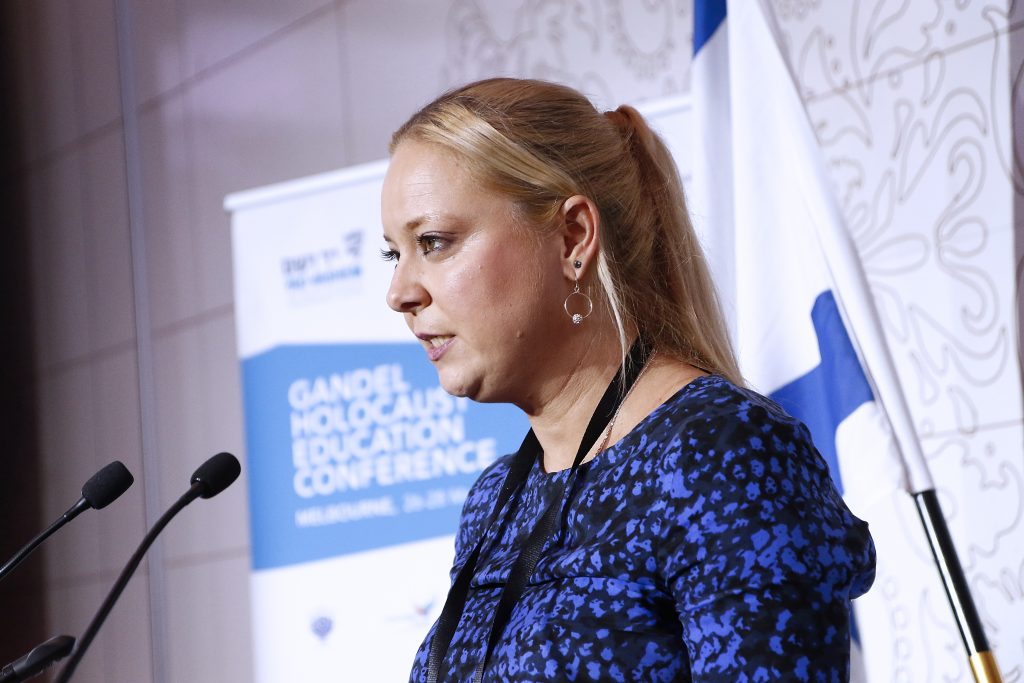Stacey Moros, Head of History at St Michael’s College in Adelaide, has been selected as the recipient of the 2021 Gandel Award for Excellence in Holocaust Education (Gandel Award).
The Gandel Award aims to recognise outstanding efforts of alumni of the Gandel Holocaust Studies Program in delivering Holocaust education in their schools and in the wider community. Stacey completed the Gandel Program in 2014, when she was a teacher at Tatachilla Lutheran College, and she continued implementing a range of Holocaust education initiatives ever since.
The Gandel Award was established in May 2019 during the inaugural Gandel Holocaust Education Conference held in Melbourne and is awarded annually. The award consists of a framed certificate and a $5,000 donation to be used for educational purposes. The winning teacher can use funds in school – or the broader school community – for Holocaust-related initiatives, to continue building the awareness and preserving the memory of the Holocaust and the lessons it holds for today.
On hearing the news, announced during an online Holocaust study session organised by Gandel Foundation, Yad Vashem and Adelaide and Perth Holocaust Museums, Stacey said she was ‘shocked and humbled’ by the announcement.
“I am so proud. Holocaust education has definitely been my passion and I feel a strong sense of duty to teach my students about the dangers of prejudice and hate. I am so grateful to have been given this amazing opportunity to study at Yad Vashem as part of the Gandel Holocaust Studies Program back in 2014. Thanks to the Gandel Foundation for their continued generosity in supporting Holocaust education in Australia,” said Ms Moros.
CEO of Gandel Foundation, Vedran Drakulic OAM said Ms Moros was an outstanding educator.
“Stacey has been involved in a broad range of Holocaust education initiatives both in her school and more broadly. She is also a regular presenter at the History Teachers Association conferences, delivering workshops on Holocaust pedagogy, and she was also involved at the Gandel Holocaust Conference in 2019. She is definitely a most-worthy recipient”, added Mr Drakulic.
Stacy’s citation notes that she received the Gandel Award “in recognition of her continuous and broad-ranging efforts in promoting, developing and delivering Holocaust education activities and initiatives”.
Past recipients of the Gandel Award for Excellence in Holocaust Education include:
2019:
1. Nicole Scott & Kristine Wolfe (VIC), Alkira College (GHSP 2013);
2. Anthony Quinn (QLD), Sommerville House (GHSP 2018);
2020:
Duane Galle (NSW), Banora Point High School (GHSP 2013).
END
ABOUT THE GANDEL HOLOCAUST STUDIES PROGRAM FOR AUSTRALIAN EDUCATORS
The Gandel Holocaust Studies Program for Australian Educators (GHSP) is a long-term professional development program aimed at training a group of expert Holocaust educators who are active throughout Australia. The objective of GHSP is to form an active and organized network of Australian educators committed to teaching about the Holocaust and its universal human rights implications, using an interdisciplinary and age-appropriate approach.
GHSP begins with a prerequisite online course, followed up by the teacher-training seminar at Yad Vashem’s International School for Holocaust Studies in Jerusalem. The full-year program continues with a follow-up seminar in Australia, a school-based project and professional exchange about issues in Holocaust education.
The Gandel Program provides educators with practical, methodological teaching tools that convey not only the Holocaust facts and the importance of remembering the past, but how to help shape a better future.
The program is delivered by Yad Vashem and supported by a number of partners. Over the past 11 years some 350 educators, representing every State and Territory, have completed the training and are now working as Holocaust education ‘multipliers’, reaching tens of thousands of students every year.

